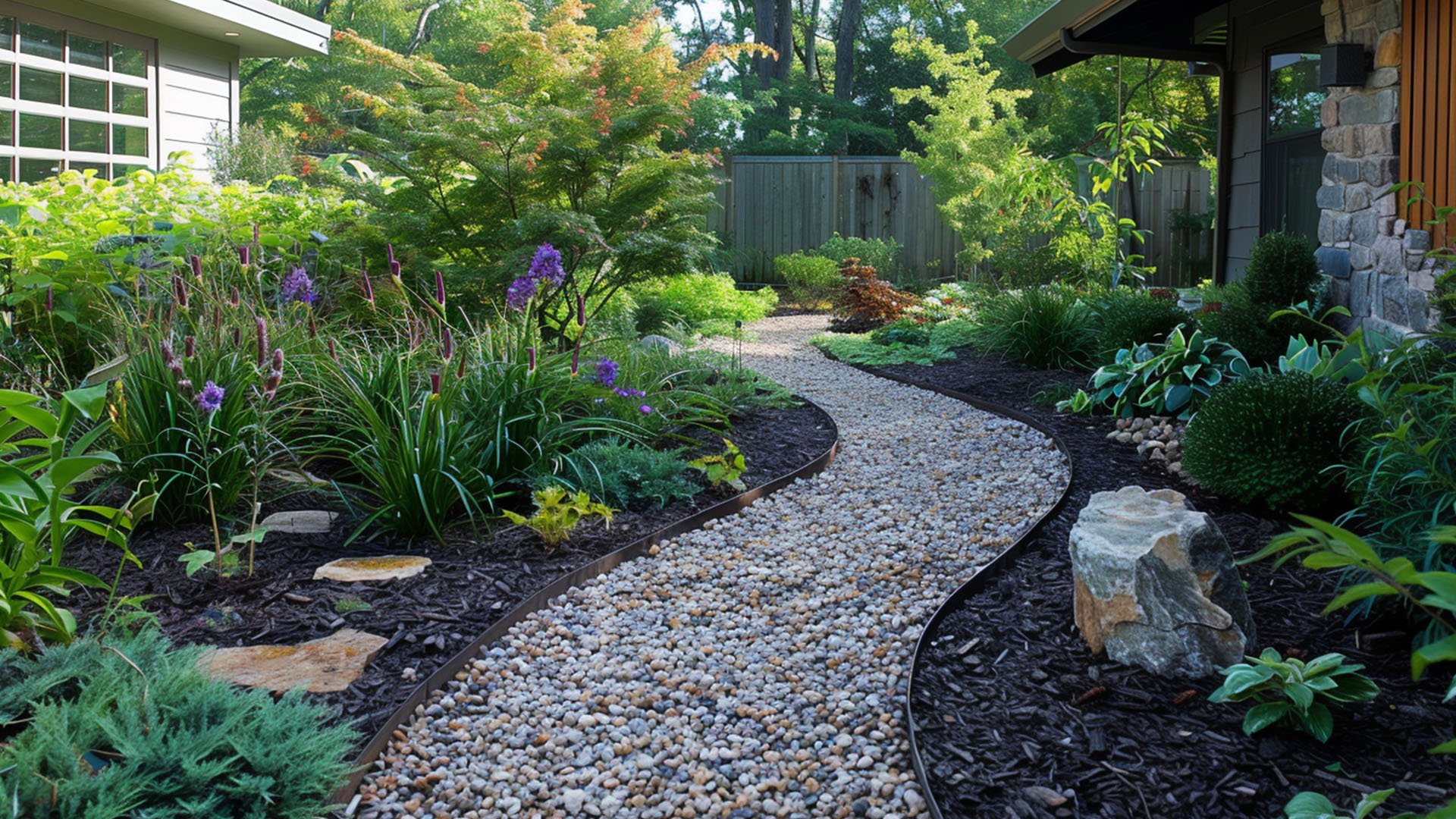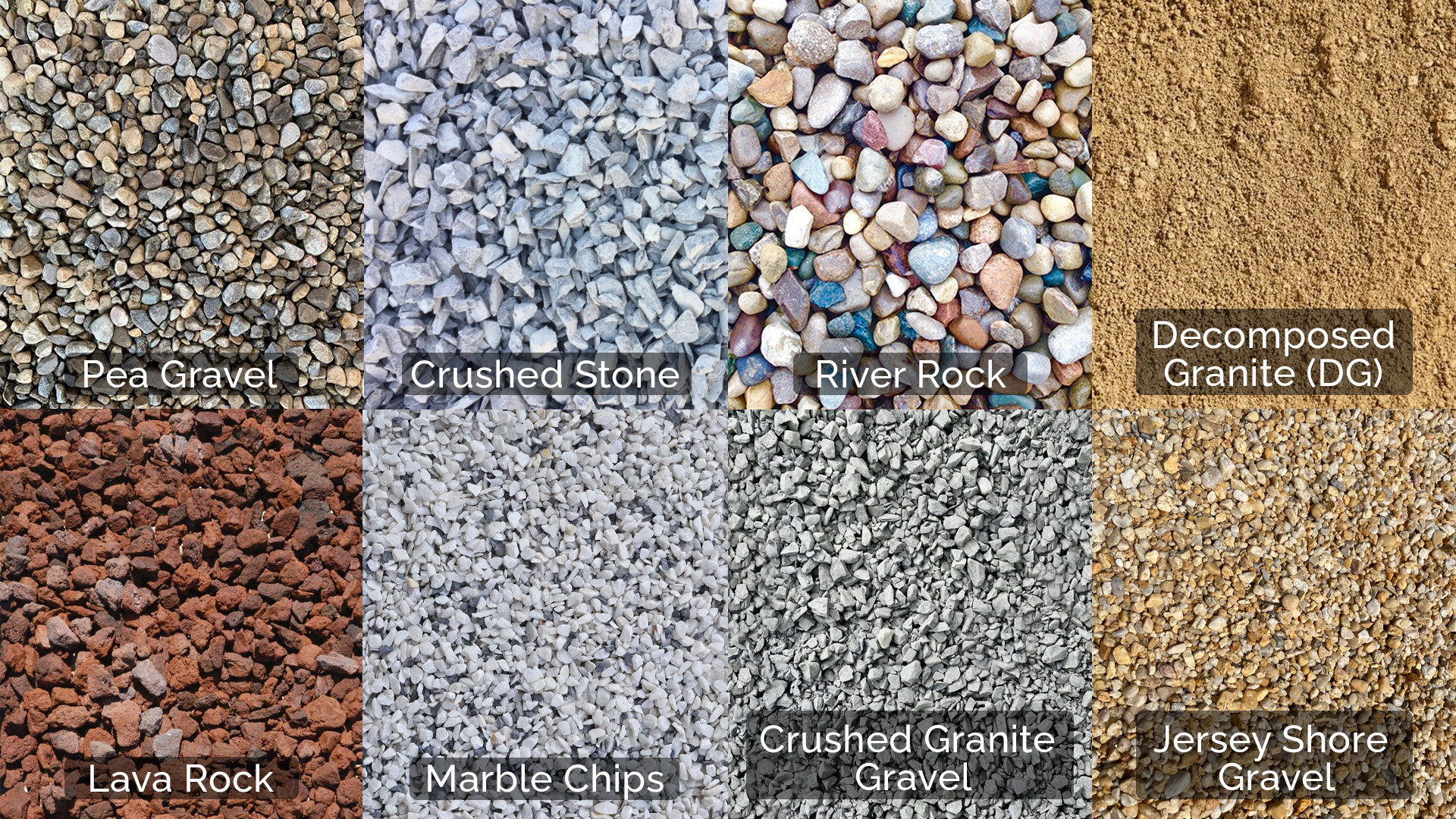Gravel is a highly versatile material that enhances both the beauty and functionality of landscape designs. Whether used for creating pathways, improving drainage, or adding texture to garden beds, gravel serves a wide range of purposes. Each type of gravel has unique characteristics, making it suitable for different landscaping needs. Here are the top 8 types of gravel for landscape designs, along with their specific applications and advantages.
1. Pea Gravel
Pea gravel consists of small, rounded stones, typically found in shades of gray, brown, and white. It is smooth to the touch, making it a popular choice for pathways, patios, and ground cover. Pea gravel is not only visually appealing but also easy to walk on, providing a comfortable surface for foot traffic. Its porous nature helps with drainage, making it an excellent option for areas that collect water, such as around patios and plant beds. Pea gravel’s versatility and natural appearance make it a staple in many landscape designs.
2. Crushed Stone
Crushed stone has sharp, angular edges and irregular shapes, which make it highly durable and compactable. This type of gravel is commonly used in driveways and for high-traffic areas because it stays in place under weight. Crushed stone is also used as a base material for patios, pavers, and artificial grass due to its stability. Beyond its strength, crushed stone improves drainage and helps control water flow, making it ideal for areas where water tends to pool. Its durability makes it suitable for both functional and decorative uses.
3. River Rock
River rock is smooth and rounded, typically sourced from riverbeds, and is available in various sizes. It is often used in water features, such as fountains and ponds, or to create dry creek beds, which add a natural, flowing aesthetic to landscapes. River rock’s smooth appearance makes it a striking choice for decorative borders, garden edges, and as a feature in modern, minimalist gardens. Its natural look and ability to manage water flow make it an excellent option for erosion control and drainage.
4. Decomposed Granite (DG)
Decomposed granite, or DG, is a fine gravel that compacts to form a stable, solid surface. It is often used for pathways, patios, and driveways due to its durability and ease of maintenance. The reddish-brown tones of DG blend well with natural surroundings, adding a rustic and earthy look to landscapes. Decomposed granite is highly permeable, allowing water to pass through and making it an environmentally-friendly option for areas that require good drainage.
5. Lava Rock
Lava rock is a lightweight, porous volcanic stone that adds a bold, dramatic touch to any landscape. Its deep red or black hue makes it a standout feature in modern, desert-themed gardens. Lava rock is often used as a mulch alternative in garden beds, where it helps retain moisture and adds texture. Its porous structure improves drainage and soil aeration, benefiting plant health. Lava rock’s unique appearance and functional benefits make it a popular choice for landscaping projects that need both beauty and practicality.
6. Marble Chips
Marble chips are small, white stones that offer a clean, elegant look for garden beds, walkways, and patios. They provide a high-end, polished appearance that complements various design styles, from formal to contemporary landscapes. Marble chips are reflective, which can help brighten up outdoor spaces by reflecting sunlight. While primarily used for aesthetic purposes, they are durable and low-maintenance, making them ideal for high-traffic areas.

7. Crushed Granite Gravel
Crushed granite gravel is a coarser version of decomposed granite, with larger stones that create a rugged, natural appearance. It is often used for driveways, pathways, and patios, offering a more durable surface than finer gravel types. Crushed granite gravel compacts well, providing stability for both pedestrian and vehicle traffic. Its durability and strength make it suitable for high-traffic areas, and its ability to handle drainage makes it a practical choice for landscapes that experience frequent rain.
8. Jersey Shore Gravel
Jersey Shore gravel features a mix of tan, yellow, and gold-colored stones, giving it a warm, beach-like appearance. It is commonly used in garden beds, pathways, and as a decorative element around patios. The combination of colors adds a vibrant touch to any landscape, especially when used to contrast with greenery. Jersey Shore gravel is compactable, making it a stable and durable option for walkways. Its bright and natural appearance makes it perfect for creating a relaxed, coastal vibe in any outdoor space.
Choosing the right gravel for your landscape design can significantly impact both the aesthetics and functionality of your outdoor space. From creating durable driveways to enhancing garden beds and improving drainage, gravel provides a variety of solutions for every landscaping need. By understanding the unique properties and applications of these 8 types of gravel, you can make an informed choice that aligns with your design goals and ensures long-lasting beauty and practicality.
